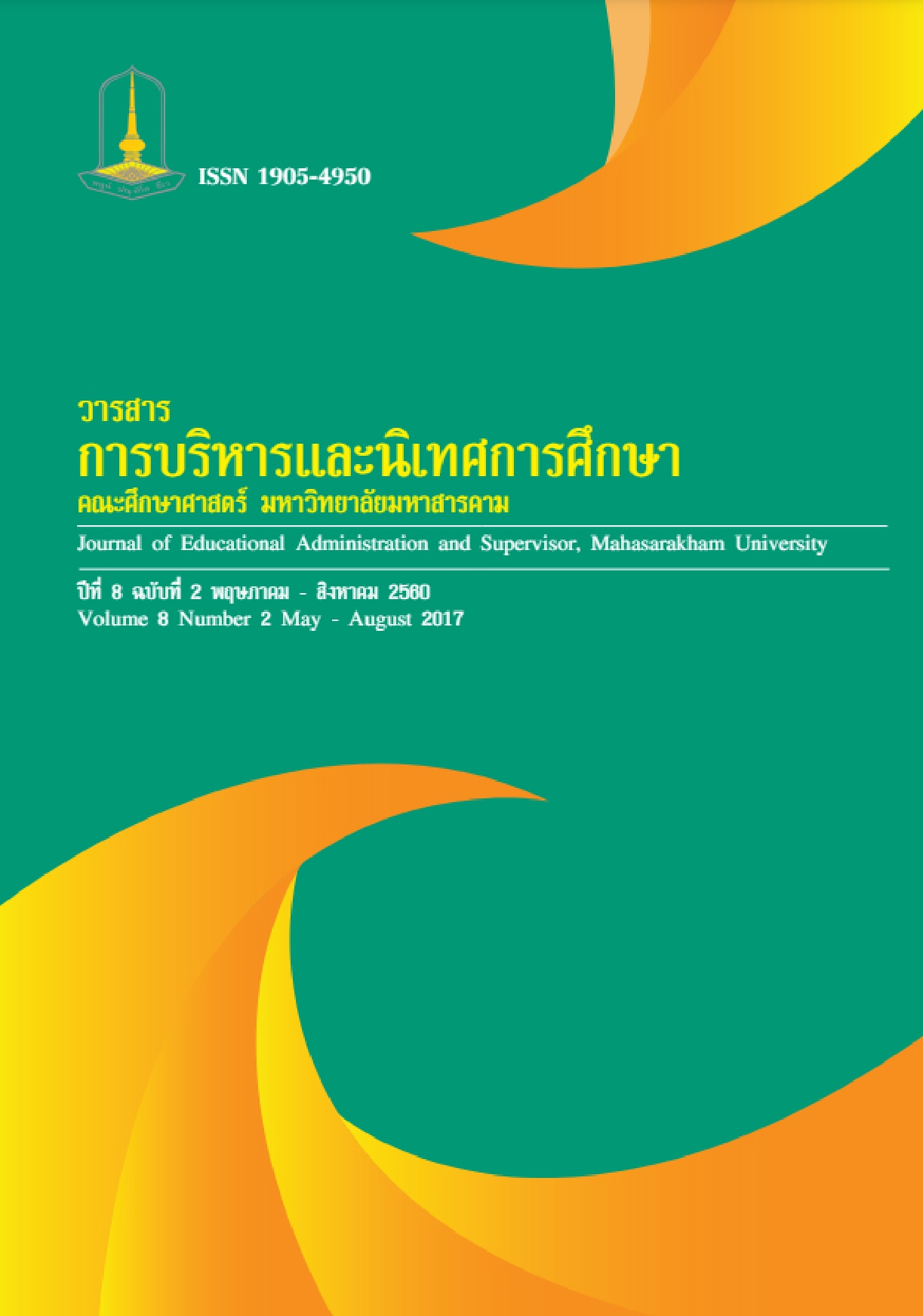Development of Academic Leadership Enhancement Program for Educational Institution Administrators under Secondary Education Service Area 26
Main Article Content
Abstract
The study aimed to 1) study the components and indicators of academic leadership of the educational institution administrators ; 2) study the current state and desirable state of academic leadership enhancement of the educational institution administrators ; 3) design an academic leadership enhancement program for the educational institution administrators. The study was divided into 3 phases. In Phase 1, the certified scholars who assessed the components and indicators comprised 5 certified scholars in educational administration. In Phase 2, the sample comprised educational institution administrators, deputy educational institution administrators for academic affairs, and teachers, totally 129 persons, obtained through stratified random sampling. In Phase 3, the certified scholars who assessed the academic leadership enhancement program for the educational institution administrators comprised 5 educational institution administrators and deputy educational institution administrators for academic affairs. The instruments for data collection comprised a suitability assessment form, a questionnaire inquiring about the current state and desirable state, which was a 5-level rating scale questionnaire with the discrimination ranging from 0.33 to 0.73 and the total reliability of 0.82, an interview form, and a suitability assessment form for the program. The analysis employed the mean and standard deviation.
The results are as follows: 1. The components of academic leadership of the educational institution administrators were in 3 aspects and there were 11 indicators. They were: 1) defining the mission, with 3 indicators ; 2) administration of the curriculum and teaching, with 4 indicators ; and 3) promotion of instructional atmosphere, with 4 indicators. The assessment of the components and indicators of academic leadership of the educational institution administrators revealed high suitability. 2. The study revealed that the current state of academic leadership of the educational institution administrators was in the high level, on the whole and on every aspect, and the desirable state of academic leadership of the educational institution administrators was in the high level, on the whole and on every aspect. 3. The academic leadership enhancement program for the educational institution administrators had the following components: principle, objective, content, method of development, and evaluation. In order to equip the educational institution administrators with academic leadership, the content of the program was designed to emphasize the content according to the need indexes of the first few needs, which were: defining the mission, promotion of learning atmosphere, and administration of the curriculum and teaching. The method of development employed workshop and training.
The assessment of the academic leadership enhancement program for the educational institution administrators under Secondary Education Service Area 26 by the certified scholars revealed that the suitability was in the high level.
Downloads
Article Details
References
จินตนา ศรีสารคาม. (2554). การวิจัยและพัฒนาโปรแกรมพัฒนาภาวะผู้นำทางวิชาการในสถานศึกษาขั้นพื้นฐาน. วิทยานิพนธ์ ปร.ด. ขอนแก่น: มหาวิทยาลัยขอนแก่น.
ธร สุนธรายุทธ. (2554). ปรัชญาการบริหารจัดการ. กรุงเทพฯ: เนติกุลการพิมพ์.
ปริญญา มีสุข. (2552). ผลของการออกแบบโปรแกรมการพัฒนาทางวิชาชีพแบบมีส่วนร่วมของครู. วิทยานิพนธ์ ค.ม. กรุงเทพฯ: จุฬาลงกรณ์มหาวิทยาลัย.
พนัส ด้วงเอก. (2555). การบริหารงานวิชาการของผู้บริหารสถานศึกษา สังกัดสำนักงานเขตพื้นที่การศึกษาประถมศึกษาบุรีรัมย์ เขต 1. วิทยานิพนธ์ กศ.ม. บุรีรัมย์: มหาวิทยาลัยราชภัฏบุรีรัมย์.
รุจิร์ ภู่สาระ. (2545). การเขียนแผนการเรียนรู้. กรุงเทพฯ: บุ๊ค พอยส์.
วานิสินธุ์ ผาลา. (2557). การพัฒนาตัวบ่งชี้ภาวะผู้นำทางวิชาการของผู้บริหารโรงเรียน สังกัดเทศบาลเมืองนครพนม. วิทยานิพนธ์ กศ.ม. นครพนม: มหาวิทยาลัยราชภัฏนครพนม.
วิเชียร วิทยาอุดม. (2550). การพัฒนาองค์การ: Organization Development. กรุงเทพฯ: ธนชัชการพิมพ์.
สันต์ ศูนย์กลาง. (2551). การพัฒนาหลักสูตรฝึกอบรมเสริมสร้างทักษะการปฏิบัติวิชาชีพเพื่อพัฒนาผู้เรียนแบบองค์รวม สำหรับครูระดับการศึกษาขั้นพื้นฐาน. ปริญญานิพนธ์ กศ.ด. กรุงเทพฯ: มหาวิทยาลัยศรีนครินทรวิโรฒ.
สำนักงานเขตพื้นที่การศึกษามัธยมศึกษา เขต 26. (2557). รายงานประจำ ปี. กลุ่มงานและแผน สำนักงานเขตพื้นที่การศึกษามัธยมศึกษา เขต 26.
สำนักงานคณะกรรมการการศึกษาขั้นพื้นฐาน. (2552). แนวทางการกระจายอำนาจการบริหารและการจัดการศึกษา. กรุงเทพฯ: โรงพิมพ์ชุมชุมสหกรณ์การเกษตรแห่งประเทศไทย.
สุเทพ พงศ์ศรีวัฒน์. (2549). คุณลักษณะภาวะผู้นำการเปลี่ยนแปลงในสถานศึกษา. http://suthep.ricr.ac.th.
Davis, G. and Thomas, M. A. (1989). Effective Schools and Effective Teachers. Boston: Allyn and Bacon.
Elmore, R. (2000). Hard questions about practice. Educational leadership. 59: 8. Pp. 22-26.
Hallinger, P. and Murpy, J. (1985). Assessing the Instructional Management Behaviors of Principals. Elementary School Journal, 86(2): 217–248.
Hoy, Wayne K and Miskel G.Cecil. (2005). Educational Administration Theory Research and Patrice. Singapore: Grow-Hill Inc.
Leithwood, Jantzi and Fernandez. (2006). Transformational Leadership and Teacher commitment to change. In J. Murphy and K.S. Louis (Eds.) Reshaping the principaship: Insights from transformational reform effects. California: Corwin Press.
MacNeil, C. and others. (2003). Educational leadership: Culture and Diversity Gates head. Athenaeum Press.


